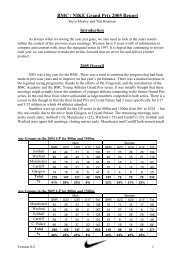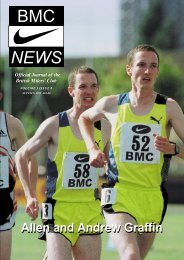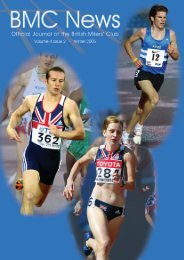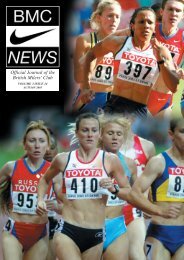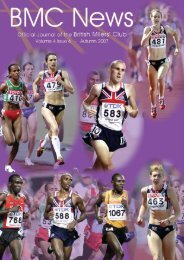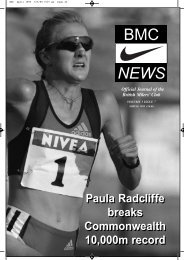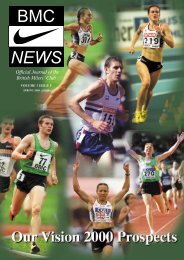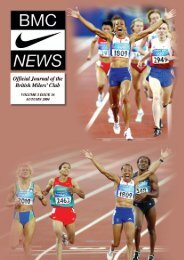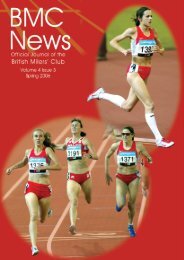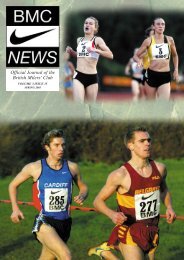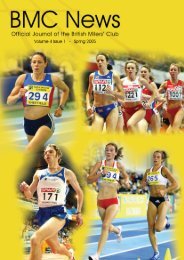BMC NEWS - British Milers Club
BMC NEWS - British Milers Club
BMC NEWS - British Milers Club
You also want an ePaper? Increase the reach of your titles
YUMPU automatically turns print PDFs into web optimized ePapers that Google loves.
y Sebastian Coe<br />
In my opinion<br />
PUTTING THE GENE GENIE BACK IN THE BOTTLE<br />
CHANNEL 4 recently charted the sharkinfested<br />
waters of political correctness<br />
and emerged intact. It has often been<br />
the graveyard of eminent scientists, Sir Roger<br />
Bannister included, when consideration has<br />
been given to sporting prowess and race.<br />
Channel 4 attempted to identify genetic advantages<br />
that might account for the dominance of<br />
Kenyan middle and long-distance runners, since<br />
they first emerged on the world stage at the<br />
Mexico Olympic Games in 1968.<br />
I found it interesting, not only because for the<br />
bulk of my career Kenya’s finest, namely the<br />
Kalengin people, were chasing the same spoils<br />
as I was, but because it also left deeper<br />
questions about the philosophy of competition.<br />
Because in the past there has been so much<br />
doctrinairism and on occasions deliberate<br />
misunderstanding when there has been any<br />
discussion of ethnic differences in whatever<br />
field of activity they arise, Channel 4 did well to<br />
concentrate on the science and leave the sociologists<br />
and the rag-bag of interest groups out of<br />
the debate.<br />
Is there, they asked, any genetic inheritance<br />
of specific physiological potential that can be<br />
clearly identified and separated from socioeconomic<br />
and environmental conditioning<br />
These last two factors will always play a<br />
significant part in the making of an athlete, but<br />
they must be kept quite separate in any study<br />
searching for a true genetic difference. In<br />
poorer Third World countries the large sums of<br />
money available from success on athletics’<br />
grand prix circuit is an extremely powerful<br />
motivator.<br />
There are other important factors to be taken<br />
into account. It is quite easy to misunderstand<br />
athletics in Kenya; although it is a relatively<br />
poor country with limited financial resources<br />
for sport, it would be a serious mistake to think<br />
of Kenyan athletes succeeding on physical<br />
superiority alone. The Kenyan Federation have<br />
created a development programme at all levels,<br />
including the schools, which over the years has<br />
led to some very sophisticated coaching. This is<br />
something of which they are justifiably proud<br />
and an area from which we might learn. If your<br />
environment and economic circumstances leads<br />
to a walking and running lifestyle – Kenyan<br />
youngsters, particularly the Kalengin, run<br />
upwards of 10 miles a day to and from school –<br />
then it is not unnatural that you might want to<br />
exhibit your prowess by showing how well you<br />
can do it and in Kenya there has been a rich<br />
supply of successful role models.<br />
All this has to be stripped away before<br />
assessing any actual genetic superiority, the<br />
evidence for which might finally rest with the<br />
exercise physiologist.<br />
It is quite easy to<br />
misunderstand athletics in<br />
Kenya; although it is a<br />
relatively poor country with<br />
limited financial resources for<br />
sport, it would be a serious<br />
mistake to think of Kenyan<br />
athletes succeeding on<br />
physical superiority alone.<br />
But what of genetic superiority and does it<br />
exist Even if it were possible it would still be<br />
a morally unacceptable, if simple experiment, to<br />
transplant a significant test population of the<br />
Kalengin. They would have to live and cope<br />
with a soft Western European lifestyle away<br />
from their traditional healthy, high-energy diet<br />
and without marrying outside their own racial<br />
group. We could then see if and how long an<br />
inherited genetic advantage survived – an<br />
advantage of enhanced aerobic capacity derived<br />
from millennia of living and working at high<br />
altitude.<br />
But there are other considerations too. Like<br />
those of overall mechanical and biological<br />
efficiency; the biomechanical advantages<br />
derived from different body dimensions. The<br />
length of the leg and the relative lengths of the<br />
upper and lower parts of the leg, the positions of<br />
the attachments of the muscles around the joints<br />
of their prime movers, could also be very<br />
important. Would one gene cover it all or would<br />
researchers be looking for additional genes<br />
This is all very interesting, but we must ask<br />
whether, if any ethnic group holds a significant<br />
genetic athletic superiority, is it of any practical<br />
significance for athletes and athletics I think<br />
not.<br />
In sport the athlete is always left with the<br />
same options. Great athletes are not simply<br />
born great. No one is born a great anything. A<br />
baby may have a unique genetic inheritance that<br />
could greatly favour a particular activity but that<br />
is only a potential advantage, it does not exist as<br />
an actual accomplishment. To turn this<br />
potential into an actual ability will require the<br />
application of much study and practice, be the<br />
subject a budding athlete or musician.<br />
In short, great athletes are not born, they are<br />
made. They are a complex mix of genetics,<br />
environment, an indomitable will to win, often<br />
a sacrificial lifestyle, an excellent coach and if<br />
they are to be long-lasting, an obsession with<br />
consistency.<br />
When I started in athletics I was frequently<br />
told that I was too short to be a miler. I broke<br />
the world record three times. Later this changed<br />
to "I could not compete successfully against<br />
athletes who used performance enhancing<br />
drugs". But it must have happened. The choice<br />
has always been the same; in reality you can<br />
either quit in moral outrage, or find a way to<br />
train smarter and harder. The same holds good<br />
for competing against any group like the<br />
Kenyans, who have been designated as superhuman.<br />
Cold comfort to any athlete looking for a<br />
ready-made excuse for failure.<br />
<strong>British</strong> athletics has recently been undertaking<br />
a performance review of the sport. When<br />
it comes to looking at our relative decline in<br />
middle and long-distance running, we should<br />
not be designating supermen status to any other<br />
athletic nation.<br />
6<br />
<strong>BMC</strong> News : Spring 2001



